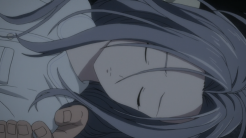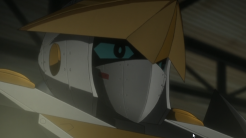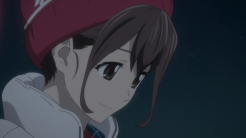





Psycho Pass belongs in the category of series that base themselves on a futuristic world that center around a basic premise. Take for example Kaiba, in which people’s minds can be extracted from their bodies, Real Drive, with its evolution of the Internet or Himitsu, where people can download the memories of dead people. In Psycho Pass, it’s all about creating the perfect society without crime. Everyone is monitored and has their own “Psycho Pass”, and as soon as your mind starts to think criminal thoughts, you’re arrested. With that as a building block, it makes its story.
The story is set to explore this setting. I won’t spoil exactly how, but I will say that over its course, it shows many different opinions about this setting. And it doesn’t just try to answer whether the setting is wrong or right, but it goes more in-depth. Every character has some good or bad points to make, and every one of those points is open to interpretations. It’s a show that aims to make you think, and even the things it just spells out for you have a lot of depth behind them. This goes on for 22 episodes and I have to say that after Guilty Crown, this has really shown how a 2-cours Noitamina series should be done.
Especially at the end of the series everything comes together, and the build-up for the story really pays off. At the beginning of the series though, this series loses some points for focusing on the same things for a bit too long. The big problem is that it focuses too much on one particular aspect of the setting, so that it has to rush to get everything else in in its second half. It manages to do this somehow, but the transition could have gone smoother.
On the technical terms, Production IG delivered some really good choreography and camera angles that really make their impact when they need to. The soundtrack for this series also is really good, and it doesn’t just have one style. It just makes use of whatever track it thinks fits the best to the scene, whether this is classical music or techno. Oh, and that’s another thing that this series loves to do: quote some famous literary works. Call it pretentious. I call it interesting if it contributes to the story. Which to me, it did.
The characters in this series are perhaps not its most memorable parts, but even they have something to write home about. It’s got an excellent villain in the form of Makishima Shougo, who for once actually has some good and interesting motivation to back himself up. Akane also might seem out of place when you first see her, but she really shines in her character-development. The rest of the side-characters also manage to have their impact, even though this series does not have the “Let’s devote all our time to the backstory of this side-character”-episodes. Instead their depth is subtly woven into the story. If you like serious series and believe that anime is too cute nowadays, then this is one series that you shouldn’t pass up.
Note: I’m going to experiment a bit more with this review format, simply because of making the Storytelling, characters, production-values, setting”-list got a bit too annoying to write down every time.
One-sentence Review: Psycho Pass explores its unique sci-fi setting really well with thought-provoking dialogue, characters and a great plot, and mostly keeps true to its promise that there would be no moe included.
Suggestions:
– Kaiba
– Himitsu The Revelation
– RD Sennou Chousashitsu




